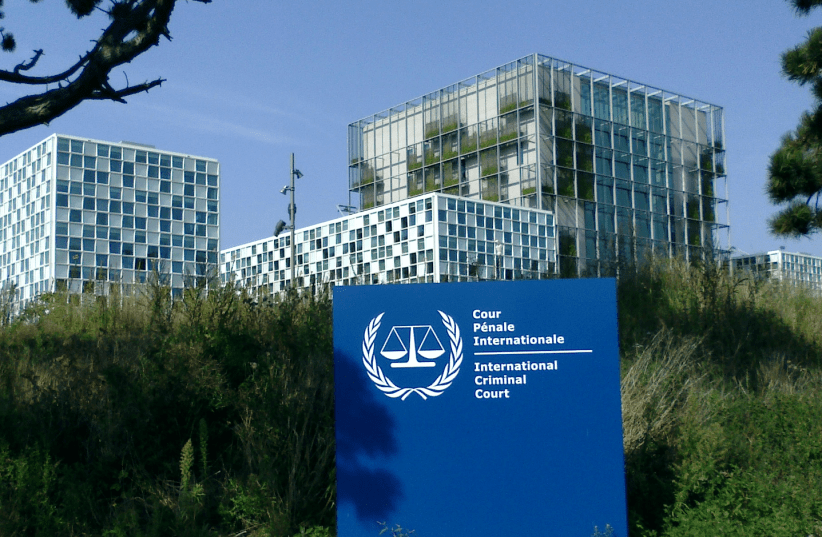Defense Minister and Acting Justice Minister Benny Gantz alarmed government officials on Tuesday when he told Reuters Israel estimates that hundreds of its citizens might be subject – in the near future – to war crimes probes by the International Criminal Court.
Gantz, who took over the Justice Ministry when the Knesset dissolved in late December, told Reuters that Israel is hard at work protecting those Israelis.
Including himself among those who could be threatened with arrest, Gantz said: “I was never afraid to go across enemy lines. I will continue to stand wherever I have to.”
In an interview near Israel’s border with Gaza, Gantz called the ruling a “negative development” and added: “We have our own teams working in different (places) to try (and) influence (the ICC).”
Gantz’s comments flatly contradicted statements by Israeli government officials in early February when Israel’s confrontation with the ICC moved into high gear.
Asked by Reuters how many Israelis might expect to be subject to arrest should the probe lead to criminal investigations, Gantz said: “I guess several hundred, but we will take care of everybody.”
Gantz called that “an estimate,” declining to say that Israel had drawn up a list of officials likely to be investigated. Israel will provide legal assistance to any targeted Israelis and will give them advice regarding travel abroad if necessary, Gantz said.
Asked if he might change his own travel plans in light of the ICC probe, Gantz said: “So far, no.”
Gantz successfully fought off a previous war crimes probe in the Dutch national courts.
Although Israel’s Foreign Ministry and Justice Ministry have worked for two decades to protect Israeli officials from prosecution overseas after various past military operations, all government authorities have said that the possibility of arrest by the ICC is remote.
Further, they emphasize that if it became a realistic danger, it would likely be years away, or in the worst case maybe several months away.
This assessment is based on an understanding of the pace at which the ICC proceeds.
In fact, ICC Prosecutor Fatou Bensouda has not initiated a full criminal war crimes probe yet, a prerequisite for getting to later stages where arrests might be sought.
Sources indicated that there was no possible way that the ICC could probe hundreds of officials due to its limited resources and mandate.
Even in the highly unlikely scenario that Israeli officials might face some risk from the ICC proceedings in the distant future, all prior ICC cases would suggest that only a few senior officials would be probed.
Gantz’s interview blindsided Israeli officials and was not part of the government’s standard messaging.
Reliable government sources speculated that Gantz himself might have been caught off guard by an unexpected question while he was out in the field with the media.
They emphasized that his concerns that Israeli officials might have to fend off arrest in the short or medium term were overstated.
After publication of the 2009 UN Human Rights Council’s Goldstone Report on Israeli violations in the first Gaza war, government officials issued official guidance about which countries to avoid. Such a briefing process has not started now and is not anticipated in the near future.
This does not mean that Israel may not make contingency plans for unlikely scenarios in the distant future the same way it might for unlikely scenarios in which weapons of mass destruction are used against Israel, said the sources. But such contingency plans are a far cry from concrete preparations that were made in the aftermath of the 2009 Gaza war.
The war crimes allegations issue came to a head on February 5 after the ICC Pre-Trial Chamber recognized a State of Palestine for ICC purposes and approved ICC Prosecutor Fatou Bensouda’s request to move forward towards a full war crimes probe against Israelis and Hamas.
There is hope in Israel that the new incoming ICC Prosecutor, Karim Khan, who replaces Bensouda in June, may be more amenable to Jerusalem’s viewpoint.
Israel is not a member of the court and rejects its jurisdiction, a position backed by allies such as the US, Germany and several other countries. Palestinians have welcomed the ruling as a chance to sue Israel on behalf of Palestinians killed or wounded in Israeli operations.
Gantz was IDF chief of staff during the 2014 war between Israel and militants in Hamas-controlled Gaza. The ICC has pointed to that conflict as a potential issue to be probed along with the settlement enterprise and the 2018 Gaza border conflict.
More specifically, many Israeli government officials believe that no IDF officials will face arrest or charges because the ICC cannot indict citizens of a state which probes war crimes allegations on its own.
Despite criticism by some human rights NGOs, Israel has sent many IDF soldiers to jail in recent years for wrongful killing of Palestinians, has carried out over 30 criminal probes and has conducted over 500 initial reviews of incidents relating to the 2014 Gaza War.
